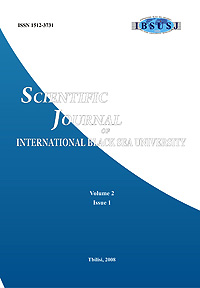Accommodating Monetary Policy in Transitional Economies: Particularities
Keywords:
monetary policy, transitional economy, reduce-form evidence, long-run economic growth, inflationAbstract
This paper surveys the particularities of monetary policy as a powerful governmental weapon in countries with transitional economies. The paper combines the theoretical analysis with empirical studies. Because in transitional economies the particular channels of monetary policy are diverse, continually changing, and uncertain reduce-form evidence are used to evaluate the empirical evidence. The brief view of relationships between movement in money supply (M1 and M2) and output level (nominal GDP) in Georgia illustrates the close correlation between them. Georgian economy like others transitional economies suffers from "Great Transitional Depression" and macroeconomic equilibrium occurs at recessionary gap. In transition countries initially supply is more elastic and elasticity increases more rapidly than that in developed countries. In these circumstances expansionary monetary policy effects real aggregate economy stimulating economic growth with mild inflation. In industrialized countries accommodating discretionary monetary policy entails cost-push inflation without any change in long-run GDP.Downloads
Published
2008-05-08
Issue
Section
Legal and Social Sciences, Economics
License
Authors who publish with this journal agree to the following terms:
- Authors retain copyright and grant the journal right of first publication with the work simultaneously licensed under a Creative Commons Attribution License that allows others to share the work with an acknowledgement of the work's authorship and initial publication in this journal.
- Authors are able to enter into separate, additional contractual arrangements for the non-exclusive distribution of the journal's published version of the work (e.g., post it to an institutional repository or publish it in a book), with an acknowledgement of its initial publication in this journal.
- Authors are permitted and encouraged to post their work online (e.g., in institutional repositories or on their website) prior to and during the submission process, as it can lead to productive exchanges, as well as earlier and greater citation of published work (See The Effect of Open Access).

